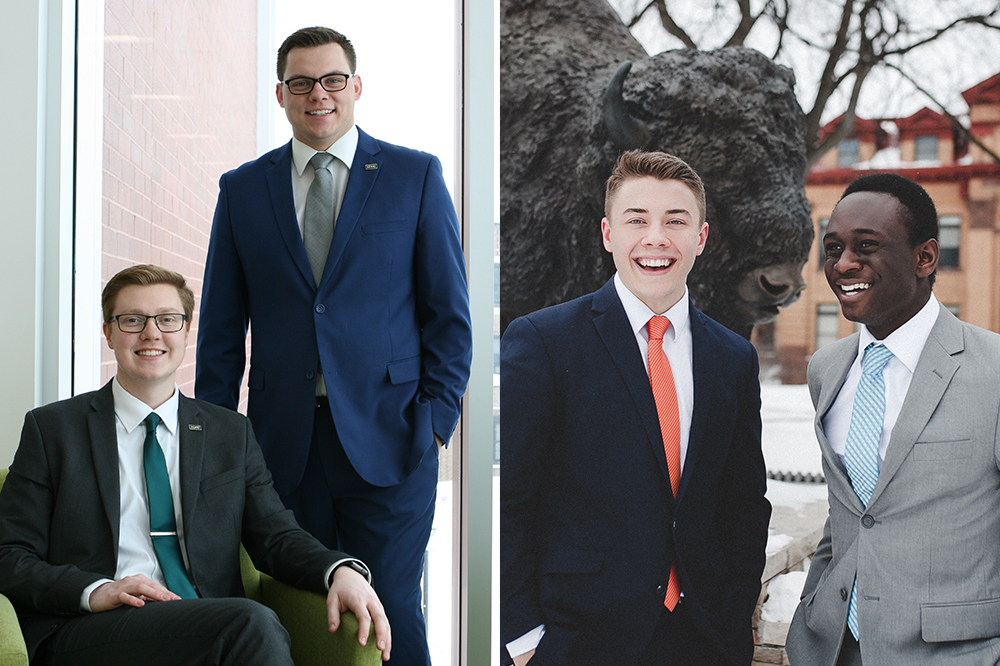The campaign trail has begun for all students running

Rademacher and Vollmer (Left) Nichols and Wognin (right)
There are two separate parties running for the positions of Student Body President and Student Body Vice President at North Dakota State.
In one corner, there is Kole Nichols and Ivan Wognin, and in the other corner, there is Mason Rademacher and Joseph Vollmer.
Rademacher and Vollmer both have years of experience in student government. Rademacher is currently the Executive Commissioner of External Affairs, and Vollmer is the Assistant Executive Commissioner of External Affairs.
While Nichols and Wognin have less experience in student government, they aren’t short on leadership. Nichols expressed that he currently has an internship with U.S. Commercial Services, and that him and Wognin have had various leadership positions across campus.
Rademacher and Vollmer have put together a three-point platform: organizational, educational and career recuperation. Rademacher called these their “visionary areas,” which are intended to be positive for all students.
In the organizational portion of their platform, the team said they want to connect more with student organizations. Rademacher noted, “Student government can come across as an elitist body,” and that this isn’t the image he wants to portray of the organization.
Instead, Rademacher said he wants to see student government be a guiding body that works alongside student organizations to “lead and strengthen organizations and organization members.”
To do this, the two have come up with some ideas to help organizations, such as making use of campus spaces easier for organizations. They also said they plan to reassess the finance code to sort out what serves students and what doesn’t.
They also said they want to make philanthropic opportunities easier for student organizations by footing the bill for some promotional options for students, such as funding posters that advertise a fundraising event.
Secondly, their education platform point will continue to focus on open education resources and expanding open education resources within classrooms. They also said they want to strengthen the Tri-College partnerships by putting on events with the other colleges as early as freshman year.
Finally, in their education platform point, they said they want to show students how to use the promotional degree map tool with the Office of Registration and Records. This tool would essentially function as an interactive map so that students can see what they need to complete their degree and what they’ve accomplished.
The third platform point, career preparation, includes programs that aim to equip students with marketable attributes. This includes increasing opportunities to receive professional certifications, localizing opportunities, finding partners and forging relationships with professionals.
One aspect of these professional opportunities in the push by Vollmer and Rademacher is to make 40-hour a week internships count as a full credit load, so students don’t need to worry about a full-time internship and their classes. This would be achieved by adding an academic component to the professional experience students would gain through the internship.
For Nichols and Wognin, their platform is about the three Cs: connect, cultivate and continue.
Under the connect point, they said they want to help bring students closer to the Fargo community, the NDSU administration and student government.
They said they plan to do this by opening up student government to students as a place to have conversations. Nichols himself said that, if elected, he wished every student on campus would sit down and have a conversation with him.
Nichols also said he wanted to build stronger relationships with NDSU alumni and work toward bridging gaps between people.
When it comes to cultivation, Nichols talked about facilitating relationships between students and alumni and collaborating with student organizations across campus.
This would also include professional advising, which would allow advisers to focus on specific majors and limit the students they work with to about 300.
The two of them said they would also like to see improved technology and improved use of technology, especially in areas such as engineering and fixing small issues.
Finally, the efforts they said they would like to continue include expanding campus safety initiatives and open education resources.
The safety initiative would be a continuation of past safety measures, and it would include training students on what to do in the event that there’s a threat to the campus, according to Wognin.
Nichols said the two of them are trying to remain “pragmatic” about what they can realistically accomplish.
Nichols also addressed the recent Twitter scandal, where a woman tweeted about the verbal mistreatment of another woman in her class by Nichols.
When addressing the tweet and the situation, Nichols said he viewed what had happened as an opportunity for some fun banter gone wrong.
“It wasn’t appropriate,” Nichols said. He continued to say that after the interaction, but before the tweet, he had apologized to the woman, though he did say, “It was not my shining moment, and I am truly sorry.”
Nichols and Wognin’s message to the student body is the same as that of Radermacher and Vollmer: go out and vote for the platform you believe in.
